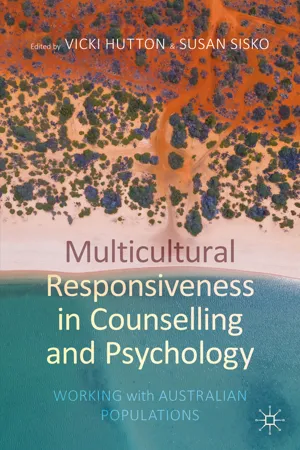1.2 What Are the Issues?
Despite the aim and intention of regulatory bodies to include multicultural perspectives in training programmes, multicultural counselling and psychology practices are falling short in making a significant impact in meeting the needs of diverse individuals and groups seeking counselling and mental health services. As indicated in a report by Mental Health in Multicultural Australia (2013), mental health services often fail to capture information on cultural and linguistic diversity, which in turn limits the level of service access or mental health outcomes in some diverse communities. Mental health experiences and outcomes of some diverse groups are very different to other Australians—first- and second-generation immigrants, refugees, asylum seekers and their families are groups of concern. The Fifth National Mental Health and Suicide Plan (2017) has highlighted the diversity of experiences of mental illness across population groups, including Aboriginal and Torres Strait Islander peoples, older age groups, the LGBTIQA communities and people living with a disability. Unfortunately, outcomes continue to show that there is a large inequity gap in Australia across all statistical categories of non-dominant groups.
Clearly, the need to include multicultural training for counsellors and psychologists is not in question, but what does remain unclear is what are the most appropriate and effective frameworks and approaches in order to deliver impactful and meaningful multicultural counselling and psychology services. To address the disparity in mental health service access and positive outcomes, we must first ask what needs to be understood and investigated in order to be able to develop and provide beneficial multicultural counselling and psychological services.
As a starting place, we need to ask whose culture and whose knowledge is underpinning multicultural counselling and psychology? Mainstream counselling and psychological training is based on traditional theories that emphasise helping clients manage their own interpersonal or internal conflicts, and this reflects a colonial and Eurocentric approach to practice that does not reference collectivist cultures or social constructs. Ways of knowing in the field have been filtered through the dominant colonial and Eurocentric values and norms, and it is from this position that multicultural counselling has been described, understood and improved. Hernández-Wolfe (2011) describes this position as “systemic suppression of subordinated cultures and knowledges by dominant Eurocentric paradigms of modernity, and the emergence of knowledge and practices resulting from these experiences” (p. 294). If traditional Eurocentric inflected counselling and psychological theories underpin multicultural counselling and psychology, how does that impact outcomes for non-dominant and diverse individuals and groups whose cultures and knowledges have been silenced? If multicultural counselling and psychology fails to explore the systems that create and maintain oppression and marginalisation of non-dominant individuals and groups, are we actually creating damaging multicultural counselling and psychological practices?
In recent decades, important progress has been made in identifying the need to include frameworks for multicultural perspectives in counselling and psychology training programmes and in practice. However, whilst these frameworks have progressed the field—in opening up discourse and practice in multicultural counselling—they may have inadvertently continued to perpetuate a colonial mindset. The broad emphasis in these frameworks has been to define sets of attitudes and beliefs that the counsellor should develop in working with clients from different cultural backgrounds to themselves. The focus has been placed on the counsellor working with individuals different from themselves. The frameworks rely on the counsellor developing an understanding of the client’s worldview or having a type of “global literacy” (Lee & Park, 2013) that “includes knowledge of ethnic variations in history, travel experience and knowledge about current world events” (p. 7). These frameworks often encourage a “how to” approach of working with different non-dominant groups, for example, how to work with Asians or how to work with LGBTIQA populations. As a result, these frameworks have been developed from traditional colonial theory where the counsellor is invited to adjust their attitudes or beliefs by understanding individual difference based on comparison to existing norms. These frameworks often maintain binary positions in order to fit simplistic ways of identifying “others” and in doing so, potentially stereotyping non-dominant individuals and groups further while ignoring intersecting identities (e.g. gay men or biracial women).
Hernández-Wolfe (2011) describes multiculturalism and a decolonising stance as not merely about cultural differences or group identities but also understanding relationships to power, access and opportunity. Further, racism historian George Frederickson states, “racism is not merely an attitude or set of beliefs; it also expresses itself in practices, institutions and structures that a sense of deep difference justifies or validates” (Frederickson, 2002, p. 6). Gorski and Goodman (2015) suggest that based on current frameworks, counsellors and psychologists may be meeting a minimal bar of cultural competence rather than a transformative multicultural responsiveness grounded in the ideals of equity and social justice. Through these ideals and a decolonising view of multicultural counselling, they propose “pushing us to gaze up the power hierarchy, where inequities are embedded in systems and structure that privilege few at the expense of many” (Gorski & Goodman, 2015, Location 341). Most multicultural counselling and psychology frameworks do not reflect the type of transformation that is necessary to ensure multicultural counselling and psychology supports cultural democracy and social justice.
The inequity gap in Australia is well established—evident across all statistical categories of non-dominant groups. Accordingly, we must be willing to delve into our history including our own socialisations, our complicities of systems and our power and...
